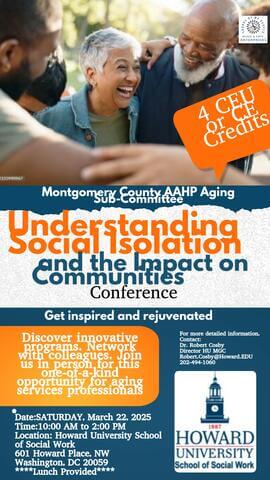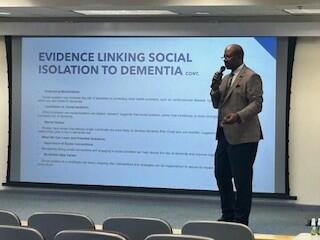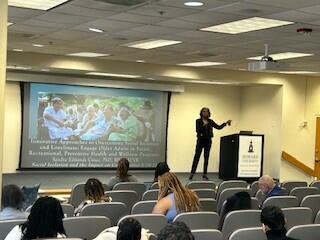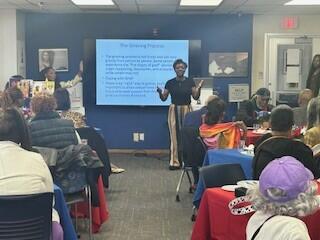Social Isolation & the Impact on Communities Conference

On March 22, 2025, the Howard University School of Social Work hosted a powerful and timely conference titled “Understanding Social Isolation and the Impact on Communities.” The event, made possible through the partnership of the Multidisciplinary Gerontology Center (HU-MGC), the Grandparents Raising Grandchildren Program, and the support of the Montgomery County Department of Health and Human Services, brought together practitioners, scholars, students, and community partners for a full day of education, dialogue, and collective action.
The conference explored the critical issue of social isolation and its deep and lasting impact on older adults, families, and entire communities. Grounded in a multidisciplinary approach, the sessions emphasized the need for targeted, culturally relevant interventions that promote wellness, independence, and dignity in aging.
Presenters and panelists shared insight into the differences between being alone, social isolation, and social exclusion—each with varying effects on mental, emotional, and physical health. Discussions underscored that social isolation is not only a public health issue but also a social justice concern, as its effects are often more pronounced in marginalized and underserved communities.
Participants examined risk factors such as depression, grief, loss of mobility, hearing and vision impairments, and a lack of access to supportive services. In exploring these challenges, presenters offered a variety of innovative strategies to combat isolation, including programs like “Art on the Brain,” friendly neighbor hotlines, virtual cultural engagement, and
group wellness calls—showcasing how technology, when made accessible and inclusive, can become a vital tool for connection.
There were also meaningful conversations about artificial intelligence and its potential to support older adults who are aging in place. Topics such as gentrification, the digital divide, and family abandonment were explored, as well as the dual role of AI in either reducing or exacerbating isolation. Attendees discussed how community and family response to these challenges can either empower or hinder the aging population’s quality of life.
A significant portion of the day was dedicated to Alzheimer’s and related dementias, including how communities understand, respond to, and support individuals experiencing cognitive decline. Presenters cited growing research linking social isolation to dementia, especially in Black communities, and addressed the emotional realities of caregiving, grief, and navigating family dynamics.
Throughout the sessions, there was a strong emphasis on grief—not only as a response to death, but also as an ongoing experience tied to identity, independence, and community loss. Attendees reflected on how storytelling can serve as a powerful healing tool for both individuals and families, helping to process complicated, chronic, and anticipatory grief.
Interdisciplinary collaboration was highlighted as essential to building community-based solutions. Recommendations included strengthening the social infrastructure by investing in public transportation, accessible green spaces, walkable neighborhoods, culturally relevant mental health services, and social services tailored to aging populations.
Conference participants shared their reflections and resonated deeply with the themes. Melinda, a community member, remarked, “I thought the presentation was fabulous. You gave information our community needs—because we don’t know. We need this information because we don’t even know how dementia starts.
Another attendee, Alma Lewis Williams, noted, “This program is necessary—especially in this time. It’s important for people to know that when they’re isolated, they’re not alone. The more we know about it, the more we can handle it.”
Shaniqua Key added, “So many people suffer in silence. They think they’re alone in feeling isolated. This is something that’s affecting minorities and Black communities. It was important to show and model the behavior we want to see. This was a great opportunity to connect and network.”
The conference concluded with a strong sense of purpose and community. It served as both an educational experience and a call to action—reminding us that addressing social isolation requires intentional collaboration, investment in community, and an ongoing commitment to equity and inclusion.
Special thanks are extended to the community partners who helped make the day a success: Sounds of My People Music and Arts Enterprises, LLC; In A Minute Café; Smoke Dat BBQ; Chesapeake Home Health Agency; Holy Cross Community Patient and Family; Plaza West Grandfamilies; East River Family Strengthening Collaborative; Montgomery County DHHS; Montgomery County Parks and Recreation; and the Howard University Multidisciplinary Gerontology Center.
As one participant put it best, “We often talk about isolation as an individual issue, but this event helped us understand it as a community responsibility.” Together, we continue building a future where older adults are not only remembered—but uplifted, supported, and celebrated.



